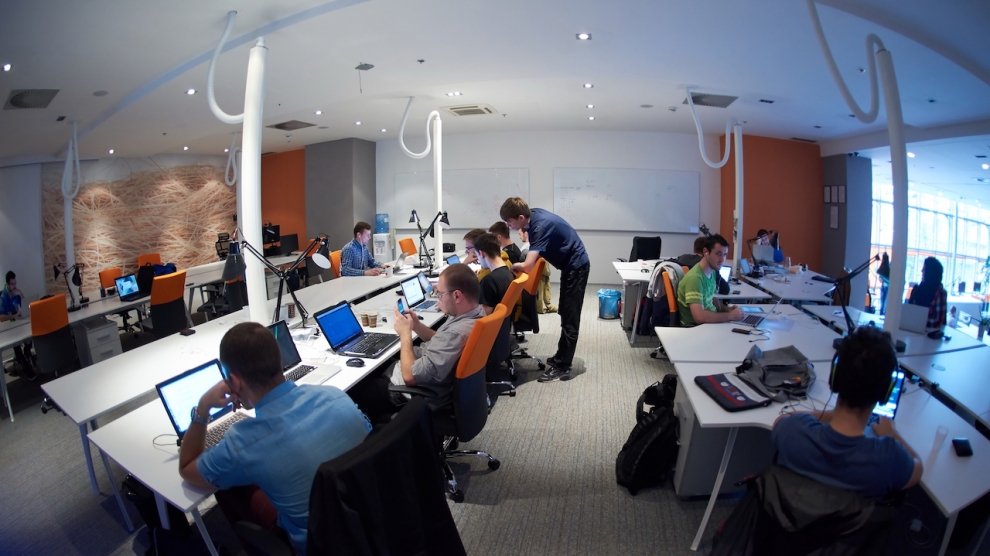The Ukrainian market for venture investment and business innovation has been actively and systematically developing since 2005. That is earlier than in most European countries. Despite the fact that it has seen significant growth, however, it still has not formed a self-sufficient ecosystem. Why? Of course, the main reason is the economy.
In the last two or three years the prevailing conditions of permanent economic, political and military crisis have killed any surge in the internal consumption of innovations. Besides that, the e-commerce market and internal innovative products in Ukraine are almost not developing at all. The GDP per capita is very small and the size and resource orientation of the economy makes it impossible to stimulate an internal demand for innovations (both B2B and B2C).
The war and political instability have greatly increased the risks in the country, creating a backdrop against which business models for investments in technology projects have become unbalanced. If we look at the internal economy venture capital fund, we see that in different periods, only 20 to 40 per cent of venture capital funds returned positive returns. The percentage of successful funds (which went up from 1:2 to 1:4 for cost of capital in 10 years) increased from five to ten per cent.
Ukrainian entrepreneurs and investors are not satisfied by the current risk-return ratio. The high potential of the country (stemming from the backward economy and an underdevelopment of the majority of sectors in the economy) can expect profitability that is commensurate with, or even superior to, a possible venture fund. The risk could be disproportionately lower for innovation risks that can be hedged by various financial instruments in the traditional economy.
So, we see great difficulties with the formation of a system and a wide pool of investment, both inside and outside the country. Actually, the complete absence of national institutional investors in venture capital, in the presence of the initiatives that have occurred in this area since 2005, supports this hypothesis. The majority of active investors in our market are the venture arms of IT companies or angel investors.
A major local entrepreneur told me, “My investment in my business brings me a profitability of 100 per cent per annum. I see no need to place money in alternative financial instruments, and especially not in such risky ones”.
In most developing countries, this gap is filled with international financial institutions, but in its current condition — war, economic and political instability — and even in the face of competition for this funding from the younger European Union countries, as well as the fast-growing markets in Asia, Africa and Latin America, our economy actually can’t get access these tools.
Well, we are done with the economy! Let’s take a look what is going on in the local ecosystem. In fact, we have 17 funds and super angels, that can invest around (either alone or syndicated) anything from $200,000 to $1 million.
Our experience of Europe and Silicon Valley suggests that in order to make one investment in the United States you must look at 100-200 projects, meet with 20-30 companies make due diligence on five-six companies. These numbers are lower in Europe.
In Ukraine, 1,000 start-ups are created per year, if we accept Steve Blank’s description, of which around 20-40 of them can claim to make $200,000-1 million per year. These numbers are too small for 17 funds and the super angels. If we look at the start-up market, in order to attract 200k — 1 million, start-ups would need to build a funnel of 50-60 investors, which in the end would provide a term-sheet of two-four.
If we look at our market through the prism of these numbers, we can see that the market is not self-sufficient. The market cannot give investors a sufficient deal flow to actively shape their portfolios. Plus, in order to observe 200 fundable projects a year, it is necessary to collect them, first, in foreign markets. The situation is the same on the start-ups’ side. It is necessary to go beyond the limits of our geography in order to obtain the necessary funnel(s).
Experience shows that many more interesting start-ups can be found outside of Ukraine, than internally, and the investors that operate in larger markets are much more experienced and professional than they are in this country. In fact, their work processes have years of experience of working with start-ups on large stream projects; many times more than Ukrainian investors.
At the moment, we see the future of Ukrainian industry venture capital investment and technological enterprise exclusively in terms of its integration into the global infrastructure. Most likely, it will have to face competition for capital, but I’m sure it’s the only thing that will push the industry.
These same problems are faced by any developing market. It is obvious that our eastern neighbours (Poland, the Baltic States, the Balkans, the Czech Republic, Romania) are addressing these issues more easily than we are, but they have highest number of start-ups in their portfolios (20-30 per cent are actively looking for money in Germany and London, and more than half of early stage investors have foreign start-ups on their books).
_______________
The views expressed in this opinion editorial are the author’s own and do not necessarily reflect Emerging Europe’s editorial policy.






Add Comment